
J.League Surpasses 12 Million Annual Visitors with Fan Marketing Backed by LINE Mini App Development and Authentication Infrastructure
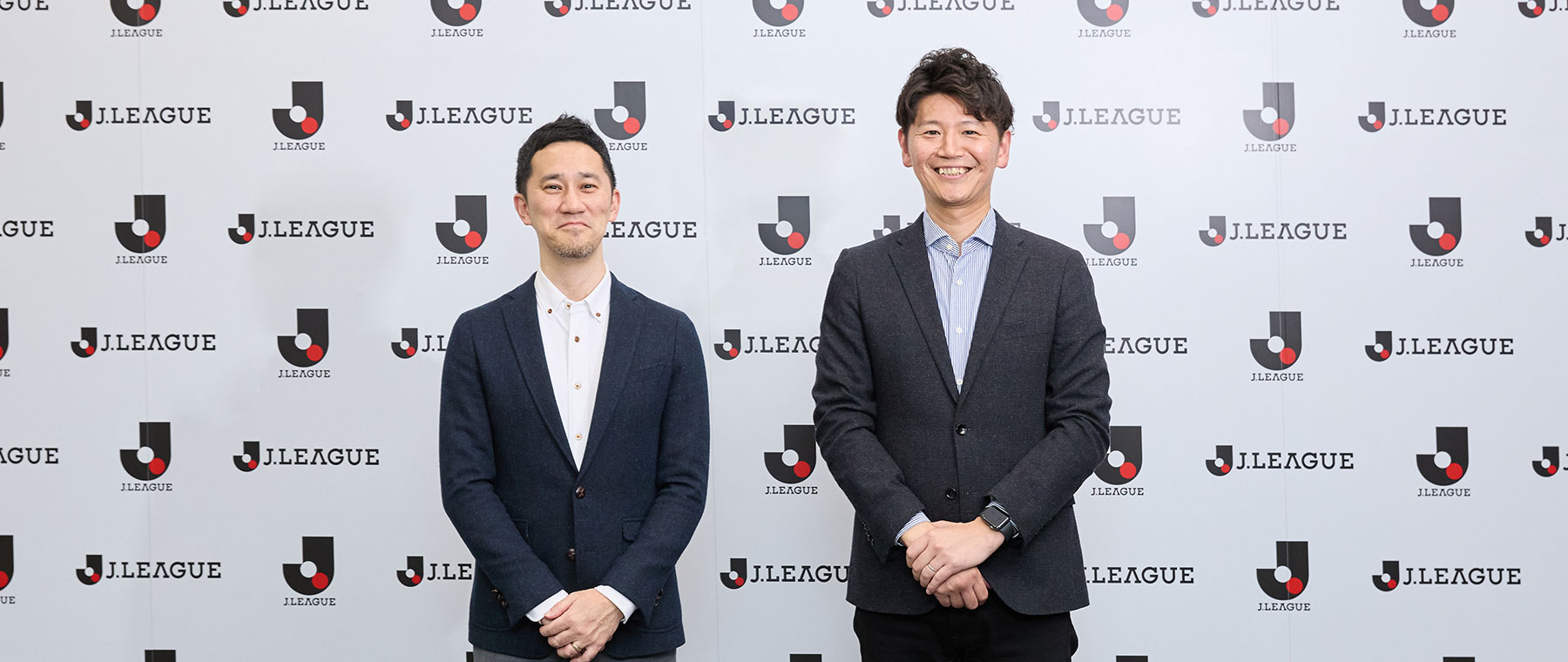
Date Published:12 MAY 2025

- Introduction of an integrated authentication infrastructure considered to accommodate expanded features of the digital common platform within J.League.
- Strengthen efforts to attract new attendees while focusing on initiatives to increase the number of repeat visitors.

- Implementation of “Barista” increased security, enabled flexible system development and expansion for each individual club.
- Succeeded in attracting new light users by developing a LINE mini app.
- Addition of new features, including instant lottery campaign functions and favorite player video content, resulted in a significant increase in friend registrations and J.League ID linkages.
The Japan Professional Football League (J.League) has recovered from the sharp decline in attendance caused by entry restrictions during the COVID-19 pandemic, surpassing a record-breaking 12 million attendees in the 2024 season. Behind this achievement lies a digital marketing strategy that has been promoted since around 2017. From 2022, the J.League implemented initiatives including opening its systems to club teams through an open platform and linking them to a marketing database, enabling the development of measures that make full use of customer data.
In October 2022, the J.League launched a LINE mini app with the aim of appealing to casual fans. For the development of this initiative, the league enlisted the support of Classmethod. Currently, the app has been adopted by approximately 70% of the 60 clubs, contributing significantly to the acquisition of new fans. We spoke with Mr. Nomizo and Mr. Ichiyanagi, who are leading the J.League’s digital marketing efforts, about the background and features of the LINE mini app, the support structure provided by Classmethod, and their future outlook.
User-Friendly Authentication and Authorization Service for Clubs
The J.League operates under the umbrella of the Japan Football Association (JFA) and is primarily responsible for managing the J1, J2, and J3 leagues, as well as youth development tournaments including the youth championships. In addition to organizing tournaments, the league also engages in community contribution activities through football and promotes stadium development projects. The Business Marketing Division places a strong emphasis on marketing and promotion, utilizing digital tools to support each club in acquiring fans and increasing attendance.
In 2017, the J.League made a significant shift toward digital marketing strategies.
As a first step, it introduced the J.League ID system to collect customer data and enhance fan engagement. This initiative enabled fans to access the latest ticket information, receive updates about their favorite clubs, participate in exclusive campaigns for J.League ID members, and purchase limited-edition merchandise. Subsequently, especially among J1 clubs, there was a growing demand to develop unique services tailored to each club’s specific needs and to increase integration with other features.
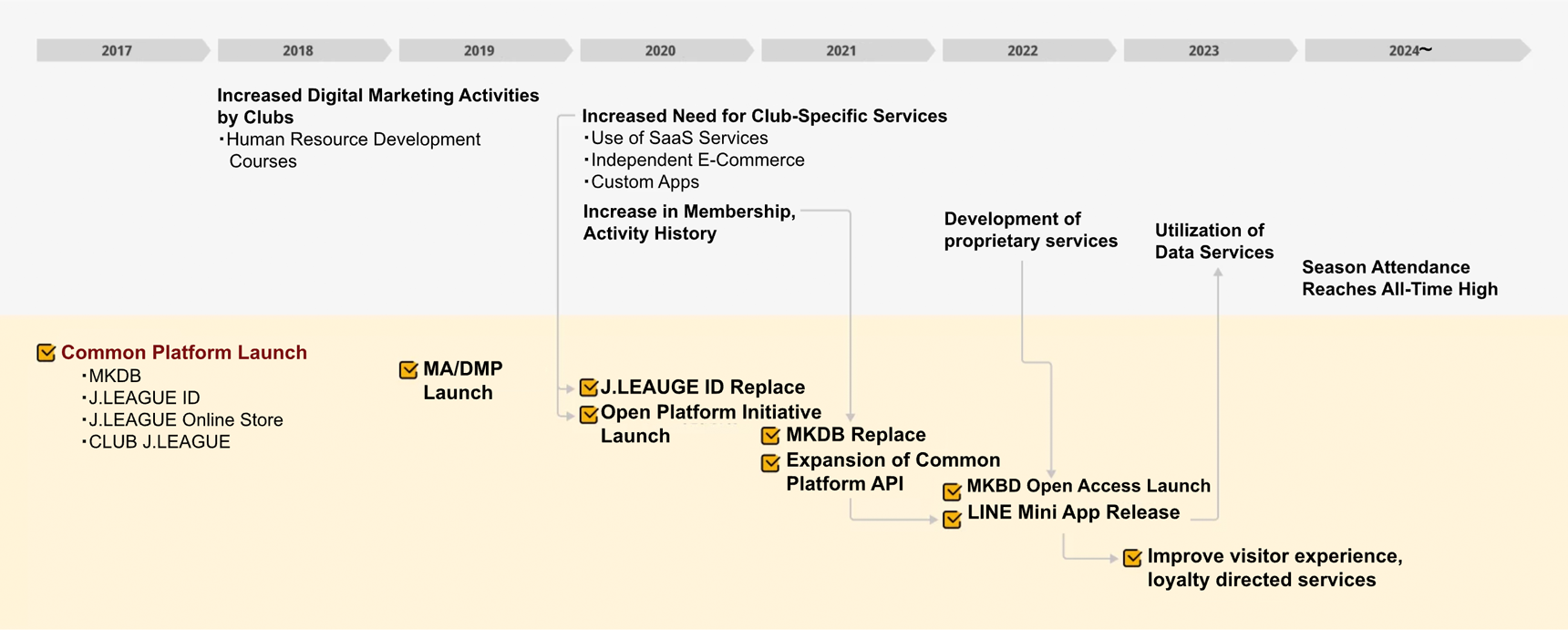
As a result, users were required to undergo identity verification or enter a password each time they logged in to each service. To address this, and to achieve centralized management including enhanced security, the J.League decided to implement Barista, an integrated membership ID authentication and authorization platform provided by Prismatics, a subsidiary of Classmethod. Barista complies with the standard specifications of OAuth 2.0/OpenID Connect 1.0, which allows for flexible system development and expansion tailored to the unique requirements of each company.
Currently, there are more than 60 services integrated with the J.League ID via API, including services outside of the J.League. As the J.League acts as a provider that issues IDs to each club, using a highly customized authentication platform would result in increased implementation effort and cost. In this regard, Mr. Nomizo recalls that “Barista was very easy to implement for each club due to its specifications.”
“Because OAuth 2.0/OpenID Connect 1.0 are standard specifications, explaining the implementation to each club went smoothly.
It also made work easier for the vendors each club works with, and in some cases, simply mentioning ‘standard specifications’ led to lower cost estimates for implementation. Even as the number of linked services increased, it was easy to expand, and Barista is very user-friendly,” says Mr. Nomizo.
To further utilize customer data linked to IDs, the J.League also provided MA tools and CRM integration, as well as holding training sessions for clubs on how to use marketing tools. In 2022, they also promoted the development of an open platform system to enable shared use of customer data held by each club.
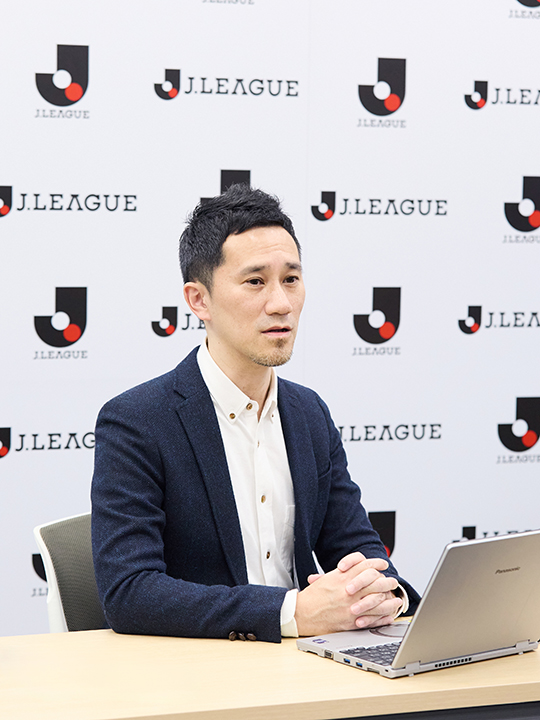
“Through large-scale promotions (TV commercials, digital ads), we raised awareness of the J.League and coordinated with invitation campaigns to get people to visit the stadium at least once. Then, we had them register for a J.League ID, analyzed the customer data, and implemented initiatives using the PDCA cycle to increase repeat visitors,” says Mr. Ichiyanagi.
Additionally, due to a decrease in media exposure including television, interest in the J.League had been on the decline. In response, efforts have been strengthened, such as the launch of the terrestrial TV soccer program “Off the Pitch” last year and collaboration initiatives with external IPs. On the local level as well, dedicated J.League staff were assigned to each club to work alongside them, which helped increase exposure. As a result, not only J1 but also J2 and J3 leagues succeeded in increasing attendance.
Proactive in Both Development and Core Understanding of App Development
The J.League has been increasing stadium attendance by advancing its marketing efforts. In 2022, the digital common platform was launched, making it easier for each club to use and creating an environment where initiatives to enhance fan engagement could be more effectively implemented. However, while the number of repeat visitors was growing, there were still challenges in attracting casual fans. To address this, the organization began offering a LINE Mini App in October of the same year. Mr. Nomizo reflects on the introduction.
“The J.League’s common platform, including CRM, had become well-established, but customer data linked to IDs only surfaced when fans purchased tickets or merchandise. We had been strengthening specific initiatives for existing supporters, but we hadn’t focused much on reaching casual fans who had never been to a stadium. That’s when we came up with the idea of the LINE Mini App,” says Mr. Nomizo.
Classmethod was asked to support the development of the LINE Mini App. Mr. Nomizo explains the reason for this. “I knew Classmethod had a strong track record in app development, including LINE. I had already worked with them in my previous job, and what left a strong impression on me was their sincere attitude of wanting to deeply understand and engage with the issues and background behind why the app was needed. That made them a trustworthy partner.” says Mr. Nomizo.
The LINE Mini App includes five main features: fan club membership card display, QR ticket display, instant lottery-style campaigns, a friend referral feature, and favorite player videos. The membership card and QR ticket display functions are linked to the J.League ID, offering convenient features for fans and supporters. The instant lottery campaign, which can be entered simply by adding the app as a friend, is mainly targeted at casual fans. By obtaining and linking a J.League ID, users can receive incentives, and fan club members can increase their chances of winning. The system is customizable by each club.
Mr. Ichiyanagi notes that many of the ideas for the campaign features emerged during agile development with Classmethod.
“By actually interacting with each product completed through agile development, a variety of ideas emerged.For example, in terms of campaigns, ideas included features such as using GPS so that users can only enter if they go to the stadium, redemption functions, the ability to offer digital content like wallpaper giveaways, and integration with forms to support delivery services. We imagined how each club might use these features and built them to be versatile while also gathering feedback from the clubs. With this project, we not only communicated in real time using communication tools, but also held daily morning meetings for direct interaction, and many ideas emerged from those sessions.” says Mr. Ichiyanagi.
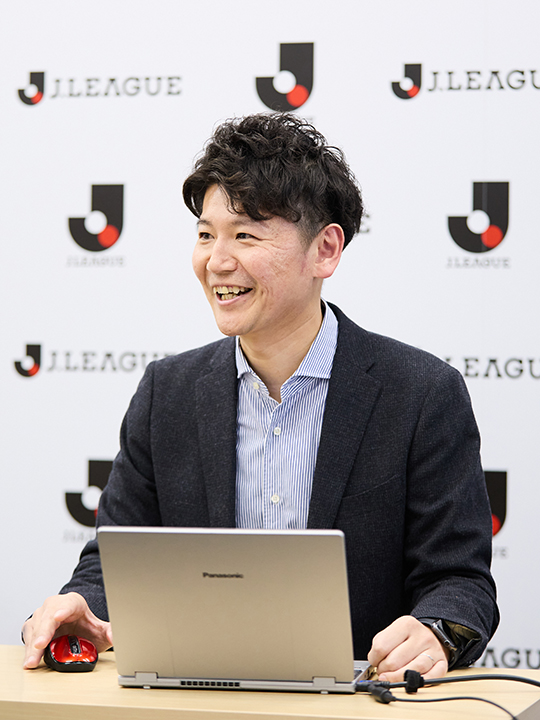
The friend referral feature allows existing supporters to send a coupon for a free ticket to friends they want to invite to the stadium. “It’s similar to a trial experience offered by delivery services. The invited person can get a free ticket, but they have to issue it themselves. By giving them a simulated ticket purchasing experience, the goal is to lower the hurdle for them to make a purchase from the second time onward.” says Mr. Nomizo.
Engineers Highly Skilled in Communication
The latest favorite player video feature was released in October 2024. Users can register up to nine favorite players—three players from up to three clubs—and watch highlight reels and match digests directly on LINE. Development of this feature began in August 2024 and was completed in just three months.
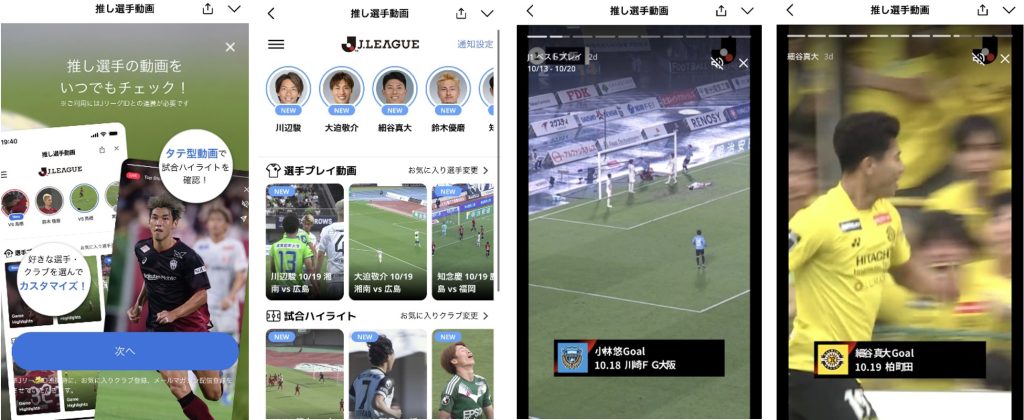
This feature was developed using the system provided by WSC Sports, which offers AI-powered customized sports content experiences.
“We basically had Classmethod proceed according to the requirements from WSC Sports. Since we didn’t have much experience working with overseas vendors, it was extremely helpful that Classmethod could handle the technical communication directly in English. Although this was the first time offering such a feature via the LINE Mini App, the development went smoothly.” says Mr. Ichiyanagi.
The organization requested various forms of support from Classmethod, including the implementation of Barista, development of the LINE Mini App, and addition of the favorite player video feature. Reflecting on the multiple projects, Mr. Nomizo says, “I was surprised that the quality remained consistently high. Although the members from Classmethod were different almost every time, the support was always thorough.
They documented the previous work and passed it on to the next person, so the information was well-shared, and communication was smooth every time.” says Mr. Nomizo.
Mr. Nomizo also mentions that the LINE Mini App was built in an AWS environment.
“Classmethod’s expertise in AWS is outstanding, so we were able to complete the development process very quickly. I’m extremely satisfied.” says Mr. Nomizo.
From a communication standpoint, Mr. Ichiyanagi also recalls, “It was a very easygoing and comfortable atmosphere. The engineers at Classmethod were all really easy to talk to, and I genuinely enjoyed the development period. When making requests, I often explained the background and the issues we were facing, and they always gave accurate and helpful responses, which made them very reliable. For the new video feature, we frequently discussed UI aspects, like whether the top video list should be displayed vertically or horizontally.” says Mr. Ichiyanagi.
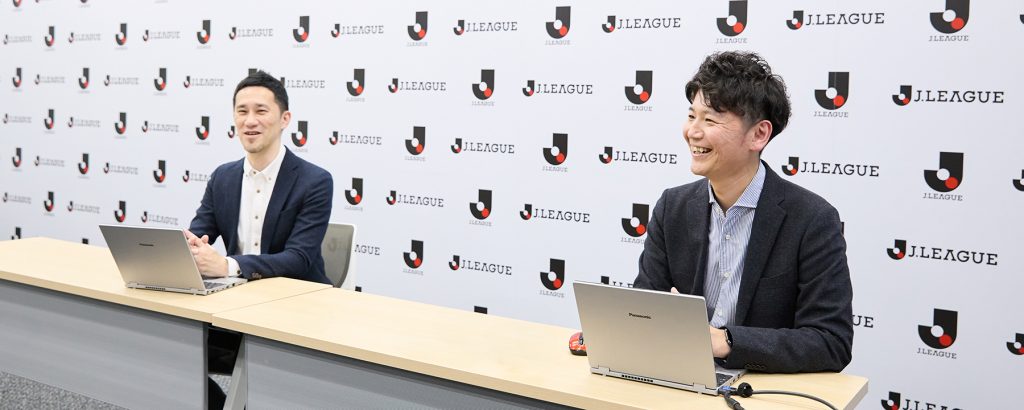
Currently, the adoption of the LINE Mini App by clubs is progressing steadily, with a total of 2.38 million friend registrations across all clubs and over 100,000 monthly users (J.League ID members only). Now in its third year since its release, the app is steadily delivering results.
Additional features are also planned for the LINE Mini App in the future. For example, while the current video feature only displays match footage, there are plans to expand it with more approachable content, including behind-the-scenes videos of favorite players.
The introduction of the LINE Mini App has also contributed to an increase in new fans, helping the J.League achieve a record-breaking 12 million attendees during the 2024 season.
“Ultimately, we want to further increase J.League ID integration and build one-on-one communication with users through LINE, beyond CRM. When it comes to attracting casual fans and creating deeper engagement, I believe LINE Mini Apps are effective not just for soccer, but for other sports as well.” says Mr. Ichiyanagi.
Through its digital marketing initiatives, the J.League has successfully revitalized the entire scene. Classmethod will continue to support the J.League in its ongoing challenges.
